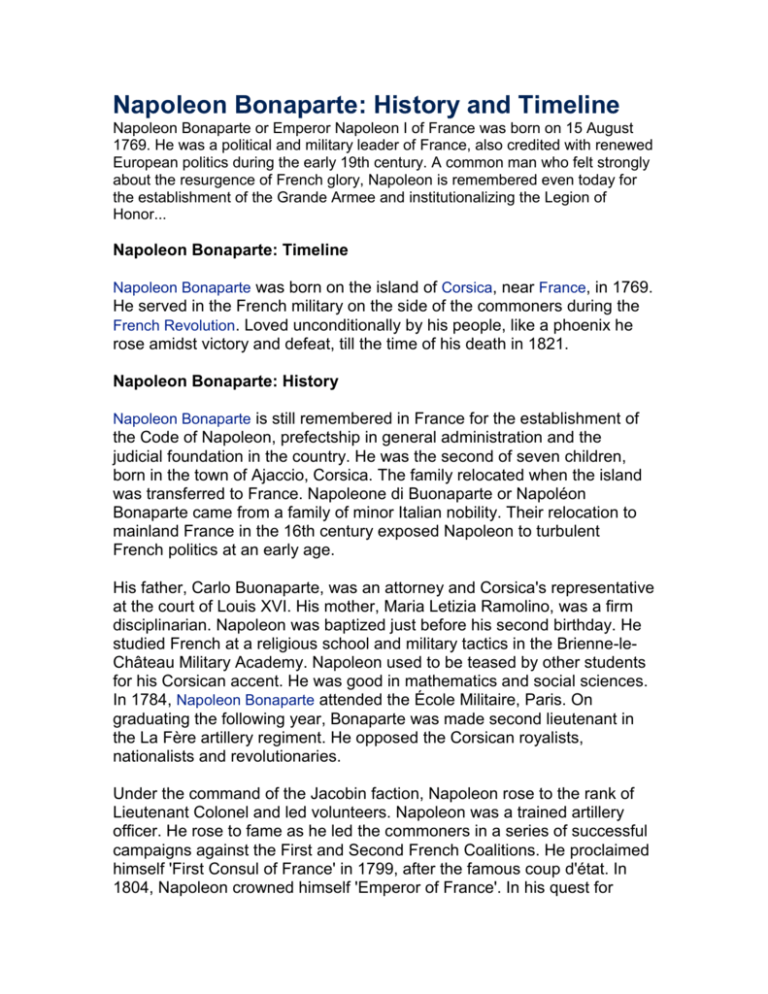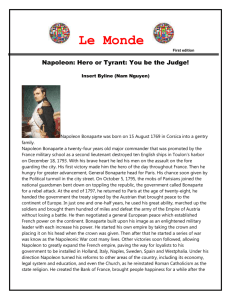File
advertisement

Napoleon Bonaparte: History and Timeline Napoleon Bonaparte or Emperor Napoleon I of France was born on 15 August 1769. He was a political and military leader of France, also credited with renewed European politics during the early 19th century. A common man who felt strongly about the resurgence of French glory, Napoleon is remembered even today for the establishment of the Grande Armee and institutionalizing the Legion of Honor... Napoleon Bonaparte: Timeline Napoleon Bonaparte was born on the island of Corsica, near France, in 1769. He served in the French military on the side of the commoners during the French Revolution. Loved unconditionally by his people, like a phoenix he rose amidst victory and defeat, till the time of his death in 1821. Napoleon Bonaparte: History Napoleon Bonaparte is still remembered in France for the establishment of the Code of Napoleon, prefectship in general administration and the judicial foundation in the country. He was the second of seven children, born in the town of Ajaccio, Corsica. The family relocated when the island was transferred to France. Napoleone di Buonaparte or Napoléon Bonaparte came from a family of minor Italian nobility. Their relocation to mainland France in the 16th century exposed Napoleon to turbulent French politics at an early age. His father, Carlo Buonaparte, was an attorney and Corsica's representative at the court of Louis XVI. His mother, Maria Letizia Ramolino, was a firm disciplinarian. Napoleon was baptized just before his second birthday. He studied French at a religious school and military tactics in the Brienne-leChâteau Military Academy. Napoleon used to be teased by other students for his Corsican accent. He was good in mathematics and social sciences. In 1784, Napoleon Bonaparte attended the École Militaire, Paris. On graduating the following year, Bonaparte was made second lieutenant in the La Fère artillery regiment. He opposed the Corsican royalists, nationalists and revolutionaries. Under the command of the Jacobin faction, Napoleon rose to the rank of Lieutenant Colonel and led volunteers. Napoleon was a trained artillery officer. He rose to fame as he led the commoners in a series of successful campaigns against the First and Second French Coalitions. He proclaimed himself 'First Consul of France' in 1799, after the famous coup d'état. In 1804, Napoleon crowned himself 'Emperor of France'. In his quest for territorial expansion, Napoleon marched on every major power in Europe. Military victories generated a sphere of influence around him in the form of political alliances. In recognition of his victory over the republican government and British troops in Toulon, in 1793, he was promoted to the post of Brigadier General. Subsequently, he earned command of the artillery arm of the Army of Italy under French command. His military exploits earned him the command over improvised forces garnered to protect the Convention held in the Tuileries Palace. Bonaparte defeated Royalist insurrection and was promoted to Commander of the Interior. In a clever political move, he broke his earlier engagement to Désirée Clary and married Joséphine de Beauharnais in 1796. Two days after his marriage to Josephine, Bonaparte took command of the Army of Italy and led a successful invasion of Italy. Thereafter, via the Battle of Lodi and Battle of the Bridge of Arcole, he proved the effectiveness of his 'envelopment' strategy that involved taking up central position and attacking two opposing and cooperating forces at the hinge, simultaneously. Bonaparte's military tactics enabled the French army to celebrate victory in 67 actions and more than 15 pitched battles. With victories like these, Bonaparte became very influential in French politics. The coup d'état and Treaty of Campo Formio made Bonaparte a hero in France. Although unsuccessful, he led the French army against the British forces in Egypt, in the famous Battle of the Nile. The tactics of fiscal destruction of the enemy and its isolation on land enroute a sea-extensive trade route was tried out for the first time. Napoleon met his match in Admiral Nelson in the Battle of the Nile. On his return to France, he capitalized on Emmanuel Joseph Sieyès' support and planned a coup to overthrow the then reigning constitutional government. Bonaparte successfully gained control and declared himself First Consul. His immediate investment of military might for territorial expansion led to a number of battles across Europe. Bonaparte institutionalized higher education, tax codes, a central bank called Banque de France, Légion d'Honneur and the Code Civil or Napoleonic code. He crowned himself Emperor Napoleon I in 1804, at Notre Dame de Paris. In 1810, Napoleon married for the second time. He married Marie Louise, Duchess of Parma, Austria, arresting thirteen cardinals for not attending the ceremony, confining the Pope for 5 years and totally defying the rules of Catholicism, with regards to marriage and annulment of the institution. Napoleon's struggle for supremacy through the Wars of the Third,Fourth, Fifth and Sixth Coalition and the Peninsular War culminated with the famous Battle of Waterloo, in 1815. Defeated by the Duke of Wellington, Napoleon was imprisoned and exiled to Saint Helena, an island in the Atlantic Ocean. The strategic location of St. Helena was chosen to ensure that Bonaparte had no way of escape. In 1821, he succumbed to deteriorating health following the development of stomach cancer, and was buried below a nameless epitaph in the Valley of the Willows, St. Helena.

